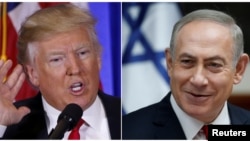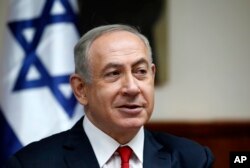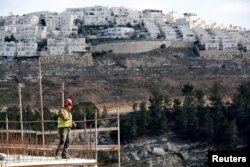Israeli Prime Minister Benjamin Netanyahu opened his weekly Cabinet meeting in Jerusalem Sunday by reaching out to Israel’s most important ally, the United States, and its new leader Donald Trump.
The two spoke by telephone, with Trump calling the conversation "very nice." He did not mention the possibility of the United States moving its embassy from Tel Aviv to Jerusalem.
Netanyahu later said Trump invited him to a meeting in Washington next month.
Before the phone call, the White House said it is "at the very beginning stages of even discussing" such a move, which Trump has said he favors.
“We congratulate President Trump on the start of his term,” Netanyahu said earlier Sunday. “I very much appreciate his deep friendship for Israel, as well as his declared willingness to fight radical Islamic terrorism with full force."
“Radical Islamic terrorism” appeared to be a swipe at Netanyahu’s old White House rival, former President Barack Obama, who refused to use the term.
The Israeli leader sees militant Islam as a mutual threat to both the Jewish state and the West, but Obama sought to separate it from the Palestinian issue, which he saw as a legitimate quest for freedom. It was one of many issues on which the two leaders disagreed.
Another was the Iran nuclear deal with the United States and world powers, which Netanyahu sees as a catastrophic mistake that threatens the security of Israel. He said Iran is one of several matters that will top the agenda with the new administration.
“There are many issues before us including the Israeli-Palestinian issue, the situation in Syria and the Iranian threat,” the prime minister said. “I would like to make it clear ... that stopping the Iranian threat, and first and foremost the threat reflected in the bad nuclear agreement that was signed with Iran, continues to be a supreme goal of the state of Israel.”
Settlements
Netanyahu also hopes to turn the page on another sore spot with the Obama administration, Jewish settlements in the West Bank and East Jerusalem, built on land that the Palestinians claim for a future state. U.S.-Israel relations plunged to a new low when, in the last days of the Obama presidency, the administration allowed a tough resolution condemning the settlements to pass in the U.N. Security Council, by abstaining from the vote instead of using its veto, as it has traditionally done in the past.
Netanyahu was furious, accusing Obama of a “shameful act” in collusion with the Palestinians. But the former president defended the move, saying the settlements are an obstacle to peace that is destroying the prospects of a two-state solution.
Israel wasted no time in trying to reverse that legacy, announcing on Sunday that 566 new housing units would be built for Jews in disputed East Jerusalem.
“On the issue of settlements, none are more concerned about it than the ... government and myself,” Netanyahu told his ministers at the Cabinet session. “And we will continue to look out for it wisely and responsibly, for the benefit of the settlement enterprise and the state of Israel.”
“We’ve been through eight tough years with Obama pressuring to freeze construction,” said Jerusalem Mayor Nir Barkat. “I hope that era is over and now we can build and develop Jerusalem for the welfare of its residents, Jews and Arabs alike.”
There are indications that the Trump administration will be more sympathetic to the settlements than its predecessor. For instance, President Trump’s choice for U.S. Ambassador to Israel, David Friedman, has challenged the notion that the West Bank is “occupied” territory, and has financially supported the large Jewish settlement of Beit El.
All of this has the Palestinians worried, especially because Trump has publicly vowed to move the U.S. Embassy to Jerusalem.
“By targeting specifically Jerusalem, they [the Israelis] are making use of the statements during the Trump elections campaign about recognizing Jerusalem as the capital of Israel and therefore legalizing Israel’s illegal annexation of Jerusalem in order to expand its settlement activities,” Palestinian legislator Hanan Ashrawi told Reuters. “[This] would bisect the West Bank and therefore prevent the establishment of a territorially contiguous or even viable Palestinian state.”
Moving the U.S. Embassy to Jerusalem could be explosive. There are fears that it could spark a new wave of Palestinian violence in the West Bank and Gaza Strip, and that protests could spread across the Arab and Muslim world.
VOA White House correspondent Cindy Saine and Kenneth Schwartz contributed to this report






